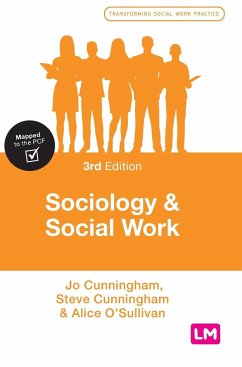Sociological perspectives can be used to analyse societal and structural influences on human behaviour at individual, group and community levels. The authors link sociological concepts, debates and theories relating to key areas such as poverty, social exclusion, education, social class and social justice to develop your students' understanding of how sociological perspectives will impact upon their social work placements and practice.
This book begins by taking you step-by-step through the ins and outs of why sociology is important to social work. It explains the relevance of sociology to everyday social work practice, introducing you to the core sociological perspectives that you'll need to get to grips with during your course, including functionalism, Marxism, symbolic interactionism and postmodernism. The book then moves on to explore various social issues in detail (i.e. poverty, social class, social exclusion, education, moral panics), with extended case studies,activities and links to skills in practice illustrating the many opportunities and challenges that each aspect brings to everyday practice. There are also important chapters on family, community and the role of sociology in social work training.
This book begins by taking you step-by-step through the ins and outs of why sociology is important to social work. It explains the relevance of sociology to everyday social work practice, introducing you to the core sociological perspectives that you'll need to get to grips with during your course, including functionalism, Marxism, symbolic interactionism and postmodernism. The book then moves on to explore various social issues in detail (i.e. poverty, social class, social exclusion, education, moral panics), with extended case studies,activities and links to skills in practice illustrating the many opportunities and challenges that each aspect brings to everyday practice. There are also important chapters on family, community and the role of sociology in social work training.

